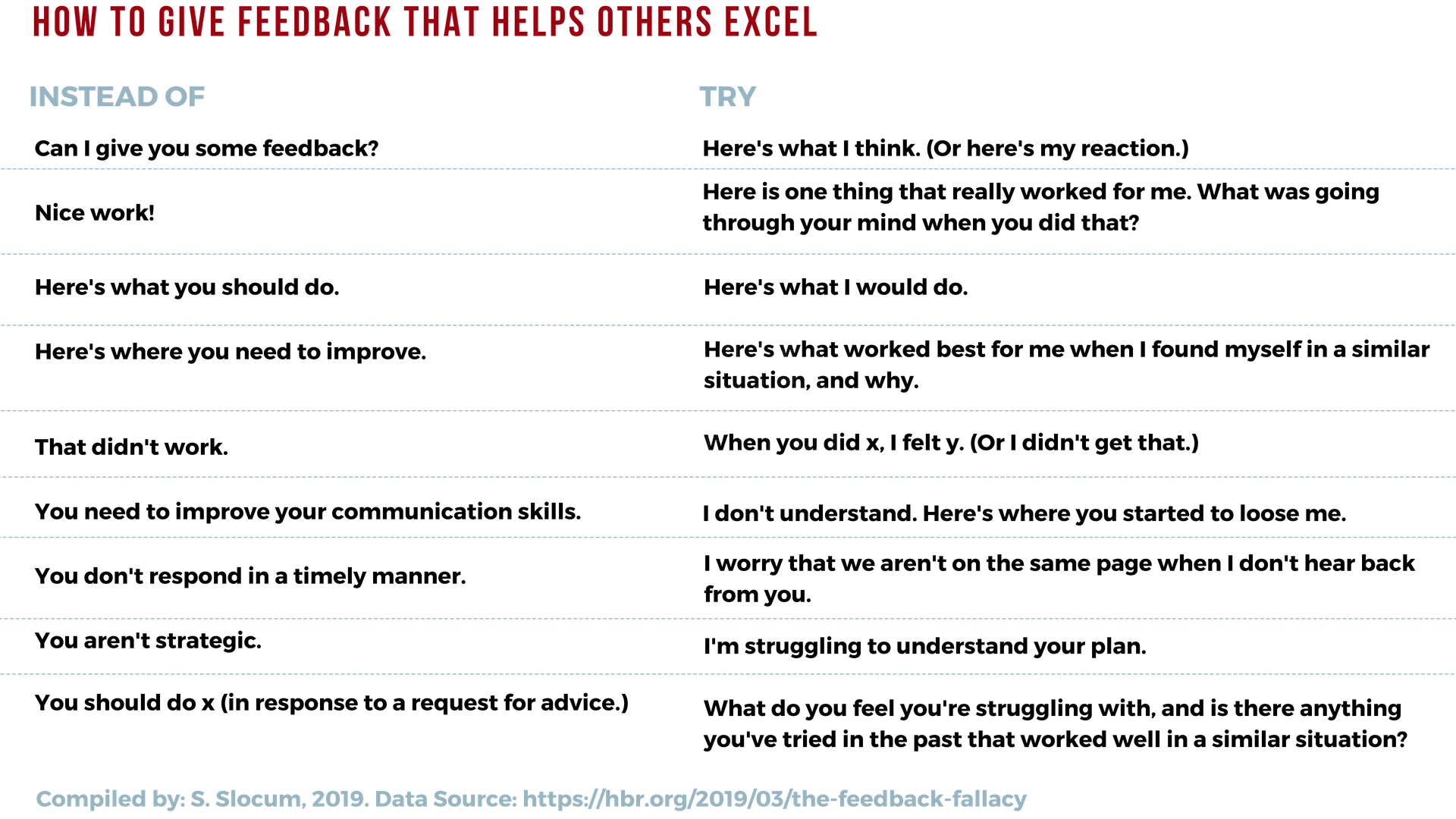When was the last time you gave or received specific feedback at work that you could immediately put into action?
I’m not talking about generic platitudes that you can’t do anything with - “You did really well there” - but real, actionable feedback that you can quickly turn into action.
For far too many engineers, the answer is “at my performance review last year”, or “never.”
FEEDBACK FAILURE
Feedback is a critical component for growth, and one many female engineers in particular struggle with getting. Many engineers and engineering managers have never learned how to give or receive feedback, so even when it's required in a performance review, it is vague and not actionable.
Many engineering professionals have been taught to avoid conflict and criticism altogether from childhood. When we are promoted to managers, we don’t know how to give constructive criticism, and we certainly don’t know how to take it. (Have you ever witnessed someone tell their manager that their directions were unclear, or their time-frame for a task unrealistic? How did that go over?)
As a result, we give feedback that is vague and not actionable, and we receive feedback by brushing off compliments when the feedback is positive and becoming defensive or taking it personally when feedback is negative.
Almost every young professional I’ve spoken with wants more feedback than they are currently getting. Many don’t know how to ask for it, or worse, assume that if they aren’t getting feedback at all, they are on their way up……..until they don’t get a raise or promotion they wanted, or are laid off due to low performance.
Simultaneously, many engineering managers lament that giving feedback is one of the aspects of their job they find most difficult and avoid it altogether. After all, engineering managers have numerous projects on their plates, and a quick correction in a final QA/QC set right before a deadline is often easier in the short-term than helping a young engineer fix an error.
I’ve also heard concerns that praise will result in “slacking off” from employees, or that criticism will hurt feelings and will result in an unpleasant emotional reaction for the person giving feedback, such as crying or anger.
Let me be clear here: If you are a manager or leader in your firm with even just one person you are supervising, and you DON’T give those you are supervising both positive and negative feedback, you are being cruel.
Why? Because instead of empowering those you work with, you are forcing your staff to fly blind and “guess” what sort of behaviors contribute most to project and team success. If you avoid negative feedback, you are enabling staff to develop habits at work that are detrimental to both their own long-term success, and your company’s long-term success.
Want exact scripts engineering managers CAN use to give negative feedback? Sign up for our email list, and we’ll send you scripts you can use for eight different common scenarios right now!
You are also sabotaging your own ability to advance by putting your need to avoid potentially uncomfortable conversations above your own staff and company’s success.
You don’t even need to take my word on this. It’s been well-documented in a number of studies, including Gallop’s 2017 study of 195,600+ U.S. employees, more than 31 million respondents, and insight from advising leading Fortune 1000 companies, which noted:
“Employees are more likely to learn and grow when they receive immediate feedback that is specific, targeted at their development and able to be put into practice right away.”
– Gallup’s 2017 State of the American Workplace report
In some offices, the once-a-year performance review is the only time employees get feedback. This process is often viewed as a necessary evil at best, and more often a waste of time. Worse, often the feedback that occurs during those once-a-year reviews is a surprise. “I thought I was doing OK,” one of my engineering friends once commented to me. “But then I found out in my review that I’d been doing all these things wrong for months, and it seemed like everyone knew this but me. I wish my manager had said something sooner.”
BAD FEEDBACK VS GOOD FEEDBACK
Vague feedback is useless but common. Specific behavioral feedback is uncommon and extremely helpful. Good feedback usually requires dialogue and isn't just one-way.
How do you know if you are receiving solid, behavioral feedback? Here’s one example.
Vague feedback: Your communication skills need work.
Behavioral feedback: When you presented in that meeting yesterday, I noticed you had a tendency to keep talking after you made your point, which seemed to result in confusion for the client as you got too deep into the details. I noticed that you also twirled your hair and generally appeared nervous during the Q&A session. In contrast, when I talk to you informally, you are concise and clearly know this subject. Let’s talk about what we can do together to help you bring that clarity into your presentations.
MANAGERS: THREE STEPS TO GIVING GOOD FEEDBACK
As a manager, your goal should always be to give and receive specific behavioral feedback, with examples of good behavior and areas for improvement. Feedback is not actionable otherwise, and if it's not actionable, it’s generally a waste of time. There are three key components of giving good feedback:
Behavior: What, specifically, did an employee do? You must give a specific example here, of either a behavior you’d like to see repeated, or one that is not to be repeated. Focus on the behavior, not the person.
Outcome: What outcome did the behavior in #1 cause? How did that behavior impact the team or the company?
Future Actions: What specific steps can you take to maintain positive outcomes, or solve negative ones? (Note: If you are giving positive feedback, this step may not be needed.)
How can you, as a manager, make sure you are giving good feedback? Let’s say you have an employee who went the extra mile and took work home with him/her to a deadline could be met, in this case a feasibility report.
Bad feedback: Thanks for doing that, glad you recognized it is part of your job to do what needs to be done. Too bad you didn’t get it done a little earlier. Now, on to the next task! (Bad feedback note: Notice the focus on the person instead of the behavior, a specific behavior is not even mentioned in the feedback.)
Average feedback: Thanks for taking that feasibility report home and getting it done, you are really a team player! (Average feedback note: This feedback is more positive, but lacks a specific connection to the outcome, which makes the employee much less likely to repeat the behavior in the future.)
Great feedback: I really appreciate that you took that feasibility report home last week to finish it without being asked because I know I can trust you to have the team’s back. You anticipated that we would not have finished it on time, and even though you had already put in a lot of work, you took it upon yourself to plan ahead and get it done so we’d be prepared to present it to the client. As a result, we were able to meet the deadline, and the client was happy with the quality of report.
Additionally, according to this recent article in the Harvard Business Review, those giving feedback should be acting as a coach toward receiver of the feedback. If you are giving negative feedback, or an employee comes to you with a question, you should be guiding the receiver towards finding the answer, as opposed telling the person specifically how to fix a problem.
Want exact scripts engineering managers CAN use to give negative feedback? Sign up for our email list, and we’ll send you scripts you can use for eight different common scenarios right now!
EMPLOYEES: HOW TO GET GOOD FEEDBACK
At my first performance review, I was told I was doing “well” and everything was “fine.” I walked out of that review feeling vaguely dissatisfied, while simultaneously feeling guilty that I wanted more. I thought to myself, “Shouldn’t I be happy that I didn’t receive any bad news?” But, the feeling gnawed at me, because surely – as an engineer only a year out of school - there was something I could improve besides the standard “you’ll gain more experience with time”?
So, the next time I asked for feedback, I took a different approach by asking questions to get to specific desirable behaviors. That feedback was much more helpful, but I would not have gotten it if I hadn’t been willing to dig for it. Was asking for ways to improve uncomfortable? Yes. Is getting actionable feedback absolutely essential for a successful career, to avoid creating bad habits or blind spots of which you aren’t even aware? Definitely.
Here are the two things you need to get good feedback at work.
Ask for feedback, and then ask again. Two questions I have used that work:
"Can you give me a specific example of what sorts of behaviors you'd like to see more of from me, or behaviors you'd like to see less of?"
“What can I do to make it easier to work with me?”
When you do get feedback, don’t take it personally, even if you don’t agree with the feedback. Instead, stay curious. Example: If you get feedback that you are “too pushy” (or forgetting for a moment that the word ‘pushy’ indicates gender bias), say “Hmm, that’s interesting but I’m not sure what you mean. Can you give me a specific example of something I did and what you think I should have done instead?”
Above all, it is imperative that you take charge of getting your own feedback. It’s rare that your engineering manager has been trained on giving feedback, and it’s one of many things your manager has on his or her plate. You are the boss of your own career, and if you don’t seek feedback, you probably won’t get what you need to perform at your own highest level. It’s rare that your engineering manager has been trained on giving feedback, and it’s one of many things your manager has on his or her plate.
HOW WE CAN HELP OTHERS EXCEL THROUGH FEEDBACK
Feedback isn’t only a manager’s or only an employee’s responsibility. Has a coworker ever saved you from embarrassment at work by giving a second opinion? That’s feedback too.
But, we also know that unsolicited feedback can be disastrous to your career. You don’t want to be that person who is known for always being critical of others, or the person who is always giving undeserved praise.
How do you walk the line? It’s actually pretty easy if you follow these two rules:
First, don’t give feedback unless it is requested, or your job requires it (i.e. you are a manager and a direct report is doing something which requires feedback).
When you do give feedback, recognize that this feedback is your opinion, and should be expressed as such. Just because something has worked for you in the past doesn’t mean it will work for the person asking for advice. Try the language below, which we’ve compiled (with minor modifications based on my own experiences) from the 2019 Harvard Business Review Article “The Feedback Fallacy”.







